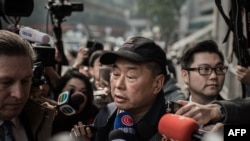As the world watched another mass protest Sunday in Hong Kong, many — including observers in Beijing — noticed that a billionaire publisher was again at the head of the march. At 70 years old, there is no sign that Jimmy Lai is slowing down.
Cameras captured Lai unfolding a banner and holding one end while 30-year-old Sham Tsz Kit, head of Hong Kong's Civil Human Rights Front, took hold of the other end. Others helped raise the banner as the crowd started down the streets.
Hong Kong's Da Kung Pao, widely known as a media outlet backed by Beijing, reported that Lai was urging others to keep pace during the march.
During a visit to Washington earlier this month, Lai traded his protest wear — a T-shirt, baseball cap and backpack — for a business suit to participate in meetings with high-level U.S. officials including Vice President Mike Pence, Secretary of State Mike Pompeo, National Security Adviser John Bolton and key members of Congress.
As a Bloomberg News report pointed out, such access is usually reserved for the most senior dignitaries. The same report portrayed Lai's treatment as a defiant signal from President Donald Trump's administration to Beijing, its rival in a bitter trade dispute.
"Trump has taken a harder line than any of his predecessors in response to China's unfair trade practices," said Clifford D. May, founder and president of the Foundation for Defense of Democracies (FDD). "I do think that Jimmy's meetings with Pence and Pompeo should be seen as encouraging. I think they — and hopefully their boss — recognize what's at stake in Hong Kong."
At the White House on Monday with visiting Pakistani Prime Minister Imran Khan at his side, Trump was asked about Hong Kong and said he had never seen protests on such a scale.
"They've been out there protesting for a very long time," he told reporters. "I've never seen protests like that, looks like two million people ... but I hope [Chinese President Xi Jinping] will do the right thing. It has been going on for a very long time, there's no question about it."
Trump also said he and Xi "are working on trade deals right now, we'll see what happens."
As for Lai's Washington meetings, Dr. Patrick M. Cronin, senior fellow and chair for Asia-Pacific Security at the Hudson Institute, told VOA that "Beijing undoubtedly will assume these meetings had the blessing of President Trump."
As Cronin sees it, Lai's visit underscored the "plight of Hong Kongers seeking to preserve their freedom and the enduring allure of the USA as a champion of freedom."
Cronin said the meetings with Lai were also valuable in their own right. "Given that this latest spate of popular protest has surprised many, it is also important for U.S. decision-makers to hear firsthand about the forces at work on the ground," he said.
Prior to Sunday's protest, Lai published a letter in his Apple Daily newspaper in which he lauded the spirit with which Hong Kong's younger generation has taken on responsibility for the territory's future. But he cautioned the young people to refrain from violence that could be used by the authorities as an excuse to crack down harshly.
'Information is freedom'
Jimmy Lai was born in 1948 in the southern Chinese province of Guangdong, north of Hong Kong. He smuggled himself to Hong Kong at age 12. Asked years later how his boyhood experience had shaped his outlook on life, he said it prepared him for a latter day "dash for freedom."
Lai says he was asked during student-led protests in Beijing and other mainland cities in 1989 to make 5,000 T-shirts for the students, "and I happily consented."
At the time, he was a wealthy businessman with a chain of clothing stores. The Tiananmen Massacre on June 4, 1989, led him to turn his attention to publishing, first with magazines, then a daily newspaper known as the Apple Daily, currently published in both Hong Kong and Taiwan. He has said that the motto that drives his publishing endeavors is "information is freedom."
"It's no exaggeration to say that without Jimmy Lai there will be no organized opposition movement in HK," said Hong Kong-based journalist Liu Kin-ming, the editor of "My First Trip to China: Scholars, Diplomats and Journalists Reflect on their First Encounters with China."
Liu says that in the run-up to Hong Kong's transition from British to Chinese control in 1997, "media in Hong Kong went through a period when self-censorship was creeping in." Lai, he said, "single-handedly transformed the media landscape and emboldened the opposition."
Liu notes that Lai, over the years, has evolved from a media owner to a political leader. Lai is known to have donated some of his fortune to individuals and civil society groups opposing Beijing's attempt to exert control over Hong Kong's political and social life.
Lai, for his part, simply said, "Hong Kong is something worth standing up and fighting for."




